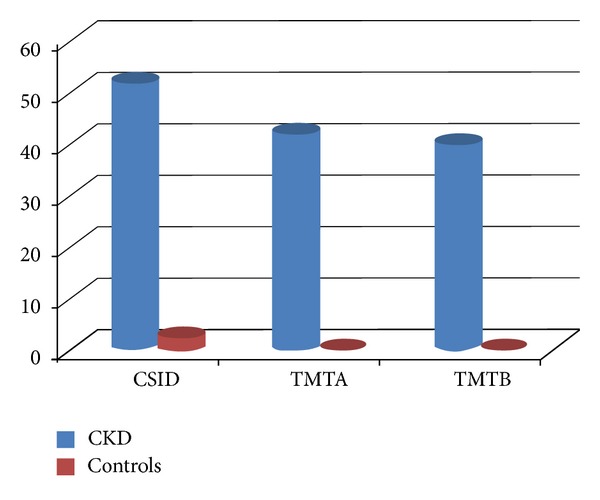Prevalence and pattern of neurocognitive impairment in nigerians with stages 3 to 5 chronic kidney disease.
引用次数: 7
Abstract
Background. Cognitive impairment with its negative effect on quality of life has been reported in chronic kidney disease (CKD). The paucity of the literature on cognitive impairment in Africans with CKD prompted this study. Objectives. To determine the frequency and pattern of cognitive impairment in patients with stages 3 to 5 CKD. Methods. We studied 79 consecutive consenting adults with a National Kidney Foundation (NKF) stage 3 to 5 CKD based on their estimated glomerular filtration rate using the Cockcroft-Gault formula. The controls consisted of healthy demographically matched subjects. Community screening instrument for dementia (CSI'D), trail making test A (TMTA), and trail making test B (TMTB) were used for cognitive assessment. Results. More CKD patients had cognitive impairment compared with controls using CSI'D (51.9% versus 2.5%, P < 0.001); TMTA (53.2% versus 0%, P < 0.001); and TMTB (40% versus 0%, P < 0.001). The odds of having cognitive impairment increased in the presence of CKD when assessed using CSI'D (OR = 2.026; CI = 1.607–2.555); TMTA (OR = 3.13; CI = 2.40–4.09) and TMTB (OR = 3.22; CI = 2.42–4.25). CKD patients performed poorer on tests of executive function TMTA (P < 0.001) and TMTB (P < 0.001) while CSI'D showed significantly lower scores on multiple cognitive domains. Conclusions. Significant cognitive impairment in multiple domains exists among Nigerians with CKD.

尼日利亚3至5期慢性肾病患者神经认知障碍的患病率和模式
背景。慢性肾脏疾病(CKD)中认知障碍及其对生活质量的负面影响已被报道。关于非洲CKD患者认知障碍的文献的缺乏促使了这项研究。目标。确定3 ~ 5期CKD患者认知功能障碍的频率和模式。方法。我们使用Cockcroft-Gault公式,基于肾小球滤过率的估计,研究了79名连续同意患有国家肾脏基金会(NKF) 3至5期CKD的成年人。对照组由人口统计学上匹配的健康受试者组成。采用社区痴呆筛查仪(CSI - d)、造径测试A (TMTA)和造径测试B (TMTB)进行认知评估。结果。与使用CSI d的对照组相比,更多的CKD患者有认知障碍(51.9%对2.5%,P < 0.001);TMTA(53.2%比0%,P < 0.001);和TMTB (40% vs 0%, P < 0.001)。当使用CSI d进行评估时,CKD存在时认知功能障碍的几率增加(OR = 2.026;ci = 1.607-2.555);Tmta (or = 3.13;CI = 2.40-4.09)和TMTB (OR = 3.22;ci = 2.42-4.25)。CKD患者在执行功能TMTA (P < 0.001)和TMTB (P < 0.001)测试中表现较差,而CSI d患者在多个认知领域得分明显较低。结论。尼日利亚CKD患者在多个领域存在显著的认知障碍。
本文章由计算机程序翻译,如有差异,请以英文原文为准。
求助全文
约1分钟内获得全文
求助全文

 求助内容:
求助内容: 应助结果提醒方式:
应助结果提醒方式:


